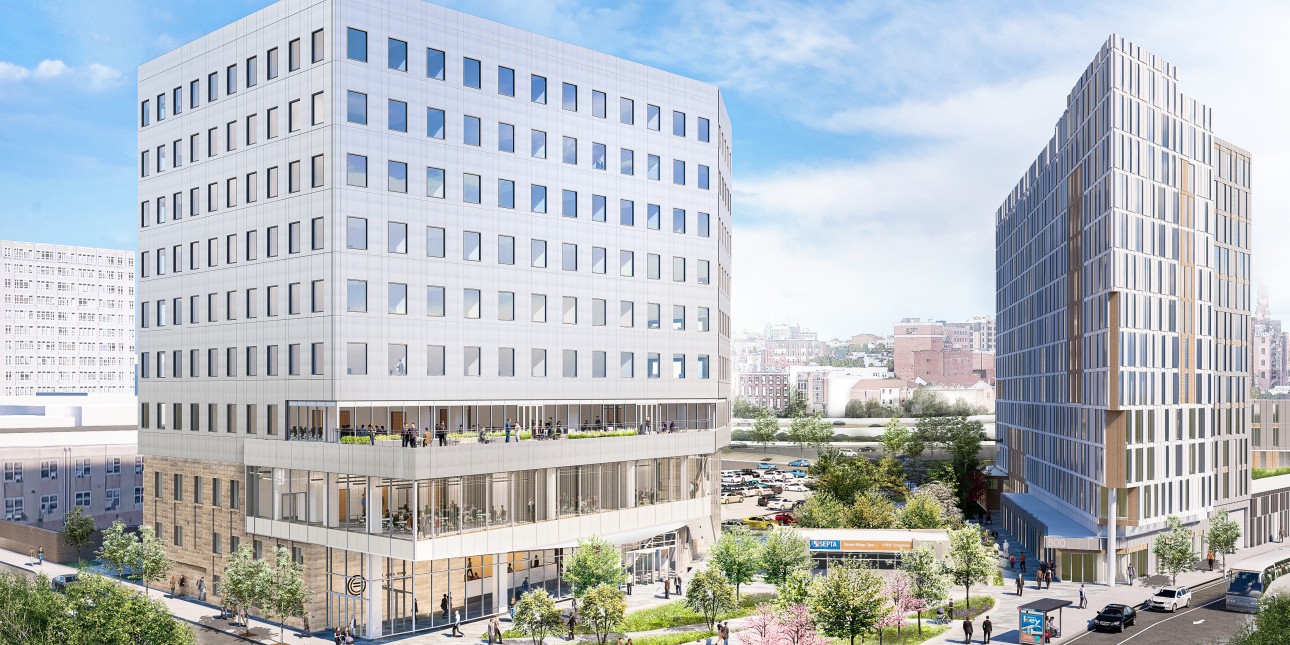The First Look at the Equal Justice Center

The first public rendering of Philadelphia’s forthcoming Equal Justice Center has been released.
The EJC, scheduled to open in 2022 on the 800 block of Race Street bordering Chinatown, will be a first-of-its kind public resource, a modern home to approximately 14 legal and social-service non-profit organizations that serve low-income Philadelphians.
The nine-story building and adjoining plaza, spearheaded by the Philadelphia Bar Foundation, are being designed by Philadelphia planning and design firm WRT, with Pennrose, LLC as lead developer and INTECH Construction as the general contractor. The building includes a third-floor outdoor terrace, a second-floor public-facing area that will be open to clients, community members, volunteers, etc., and a double-height lobby. The landscaped plaza will create an open, welcoming feeling for those who need assistance. A second-floor intake center permits walk-in clients to be referred immediately to the appropriate agency.
Thirty-thousand square feet of artfully landscaped, pedestrian-friendly, public open space will be located outside the EJC, extending pedestrian connections from Chinatown, Franklin Square and Independence Mall. Amenity spaces inside the EJC will be available for use by the community.
The EJC is just one component of the complex site to be constructed at 800-30 Vine Street site. The development will include affordable senior housing and market rate housing, as well as a hotel and public surface parking.
Construction will begin in 2020 and the Equal Justice Center will open its doors in 2022. The project will support local construction and permanent jobs in the Chinatown community.
In addition to the Philadelphia Bar Foundation, other occupants will include the Center for Advocacy for the Rights and Interests of the Elderly, Community Legal Services, Consumer Bankruptcy Assistance Project, Court Appointed Special Advocates of Philadelphia, Good Shepherd Mediation Program, Nationalities Service Center, Pennsylvania American Civil Liberties Union, Pennsylvania Health Law Project, Philadelphia Legal Assistance, Public Interest Law Center, Regional Housing Legal Services, SeniorLAW Center, and Women’s Law Project.
“The law affects the lives of low-income and vulnerable people in dramatic ways: will you lose your home, your kids, your health care, your income? Will you be able to stop the abuse you, your kids, or your grandkids are facing? Imagine you can now go to one place to get help as you face these crises in your life. A place where nationally-recognized public interest law organizations collaborate daily on serving clients of all ages, races and cultures and work to make systemic change, where they maximize their resources and brainpower, and where we can envision a world where access to justice for all is not just a lofty ideal, but a reality we help create, every day, together. This is the place,” said Karen C. Buck, executive director of the SeniorLAW Center.
One of the most powerful ways to support low-income Philadelphians is to ensure their access to justice. Eighty percent of Philadelphians facing economic hardship navigate high-stakes legal situations without a lawyer, often with their families, homes, and livelihoods in jeopardy. Studies have shown that having legal representation can make a difference.
“The first of its kind in the country, the EJC will provide holistic and more effective solutions, promote pro bono opportunities in the legal community, and encourage information sharing, collaboration, creative thinking, learning, and research,” said Jessica Hilburn-Holmes, Executive Director of the Philadelphia Bar Foundation. “This dynamic project represents a significant long-term investment and commitment by the city’s legal, business, and philanthropic communities to assure that all Philadelphians have access to justice.”
Member tenants will pay below-market-rate rent that will never increase. The tenants' operational costs will be reduced by as much as 20 percent through group purchasing and shared infrastructure such as conference and event space, internet access and other technology. The grouping of these organizations in one location will enable easier collaboration. The accessible, design-forward building is an innovation that will raise the visibility of access-to-justice issues and position Philadelphia as a national leader in the movement to leverage technology to address unmet legal needs and disrupt the cycle of intergenerational poverty.
Estimates have the EJC delivering $100 million in social and economic impact annually, or more than $2.5 billion over 25 years. The building is funded through a mix of private fundraising, Redevelopment Assistance Capital Program (RACP) grants, private debt and New Markets Tax Credit (NMTC) equity.